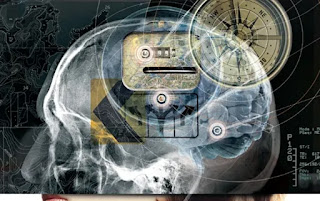I will praise thee; for I am fearfully and wonderfully made... Psalm 139:14
"Emerging evidence suggests that the brain encodes
abstract
knowledge in the same way that it represents positions in space, which hints at a more universal theory of cognition.
knowledge in the same way that it represents positions in space, which hints at a more universal theory of cognition.
In the past few decades, research has shown that for at least two of our
faculties, memory and navigation, those metaphors may have a physical
basis in the brain.
--A small seahorse-shaped structure, the hippocampus,
is essential to both those functions, and evidence has started to
suggest that the same coding scheme — a grid-based form of
representation — may underlie them.
--Recent insights have prompted some
researchers to propose that this same coding scheme can help us navigate
other kinds of information, including sights, sounds and abstract
concepts.
--The most ambitious suggestions even venture that these grid
codes could be the key to understanding how the brain processes all
details of general knowledge, perception and memory.
Unlike the place cells, grid cells do not represent particular
locations. Instead, they form a coordinate system that’s independent of
location. (As a result, they’re popularly known as the brain’s GPS.)
Each grid cell fires at regularly spaced positions, which form a
hexagonal pattern.
Different sets of grid cells form different grids: grids with larger or
smaller hexagons, grids oriented in other directions, grids offset from
one another. Together, the grid cells map every spatial position in an
environment, and any particular location is represented by a unique
combination of grid cells’ firing patterns. The single point where
various grids overlap tells the brain where the body must be.
Since the grid network is based on relative relations, it could, at
least in theory, represent not only a lot of information but a lot of
different types of information, too." QuantaMagazine
